In this article:
Milk is the first food that you are introduced to after birth and continues to be the baby’s sole source of nutrition for many months post-delivery. However, this singular dependence on milk as a vital source of nourishment tends to dissipate as the baby grows older and becomes capable of processing solid foods.
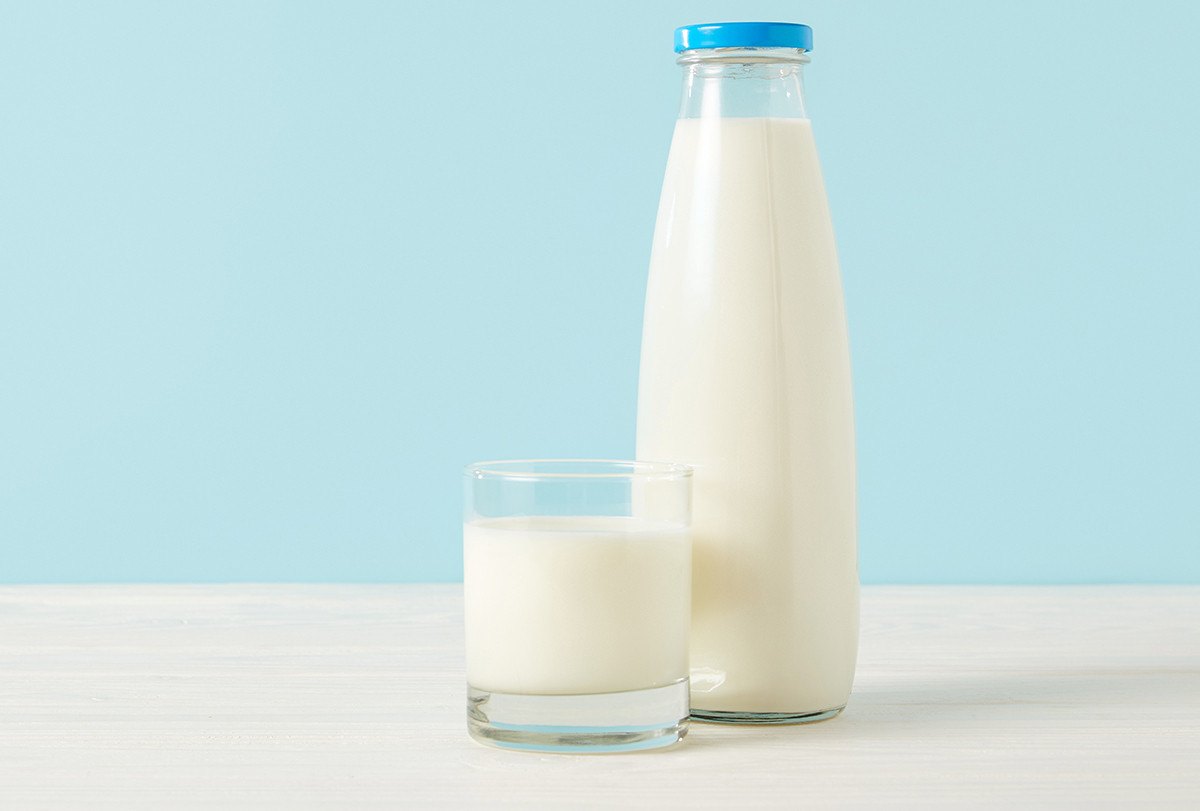
Milk tends to gradually lose its charm as we mature into adulthood, and we lose out on the wide array of health benefits that this wonder tonic has to offer. It is important to bear in mind that the growth-promoting advantages of milk are not exclusive to infants alone but continues to hold for people of all ages.
It is this rich and diverse nutritional composition that makes milk a great value addition to your diet. In fact, it would suffice to say that a wholesome and well-balanced diet is incomplete without a generous supply of dairy goodness.
Any amount of milk you drink is beneficial, but the recommended dose for adults is three one-cup servings of dairy each day. Depending upon your diet and nutritional needs, you can choose whole, 2%, 1%, or skim milk.
It’s well known that the calcium and vitamin D in milk help keep your bones healthy. But milk has many additional health benefits that will encourage you to make sure you get the recommended daily servings.
Reasons Why You Should Drink a Glass of Milk Daily
Here are 10 science-based health benefits of milk.
1. Builds muscles
If you aspire to build a strong, muscular body, milk is your go-to strength booster. The body needs protein to build muscle and milk is one of the best natural sources of good-quality protein. Thus, a diet with an adequate serving of cow’s milk, in particular, can go a long way in helping you to bulk up.
The protein in milk is 20% whey and 80% casein. While whey protein is quickly broken down into amino acids and absorbed into the bloodstream, casein is digested more slowly.
When you drink milk, your body gets the benefit of both types of protein. This dietary protein is imperative for muscle development and repair, as well as serves as body fuel during workout sessions. Also, the calcium present in milk contributes to muscle and blood health.
Drink a glass of milk after a workout to hydrate your body, build muscles, and replenish your energy levels to gear up for the next round of exercise.
2. Strengthens teeth
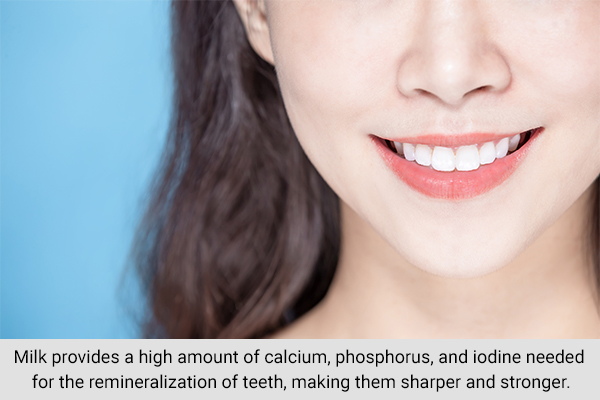
One of the best food choices for optimum dental health is milk. Milk provides a high amount of calcium, phosphorus, and iodine needed for the remineralization of teeth, making them sharper and stronger. (1)
According to a recent study done at University of Illinois at Chicago College of Dentistry, published in the Journal of the American Dental Association, washing down sugary breakfast cereal with milk reduces plaque acid levels and may prevent damage to tooth enamel that leads to cavities. (2)
The casein protein in milk forms a thin film on the enamel surface, which helps prevent loss of calcium and phosphate when the teeth are exposed to acids in the mouth or in foods and drinks. Thus, it helps prevent tooth decay and cavities. It also makes the jaw bones strong.
To enjoy strong teeth, drink milk without adding sugar. Also, try to drink milk between meals for overall oral health.
3. Promotes proper sleep
Stress is one of the main causes of sleep deprivation. Many people toss around in their bed and find it really difficult to sleep properly when under stress. Other health conditions, such as menopause, can also result in disrupted sleep patterns.
Since milk contains the amino acid tryptophan, which is associated with inducing drowsiness, drinking a glass of warm milk before turning in may help you sleep better. (3)
The body converts this amino acid into the neurotransmitter called serotonin which makes you sleepy. However, studies on the effects of tryptophan on sleep have mixed results, and more research is needed to conclusively establish its potency.
Milk is a good source of calcium, which also works as an effective natural sleep aid. It helps the brain produce the sleep-inducing substance melatonin.
The next time you are feeling frazzled, try drinking a glass of milk and reading a book or listening to soothing music to help you fall asleep.
4. Boosts hydration
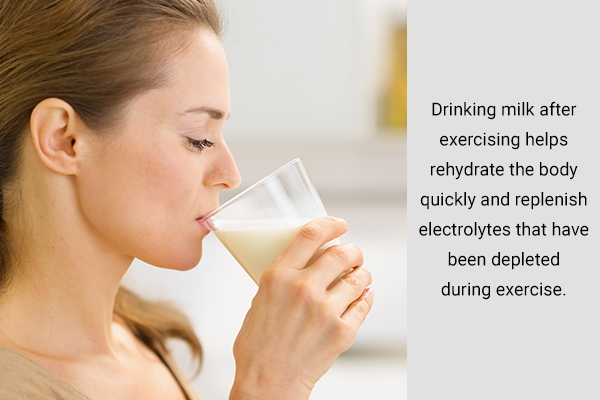
Along with water, milk is a top choice to refuel your body and keep it hydrated throughout the day. Drinking milk after exercising helps rehydrate the body quickly and replenish electrolytes that have been depleted during exercise.
Opt for chocolate milk or skim milk to speed up recovery from a hard workout or sports activities. (4) Chocolate milk has a unique combination of protein, carbohydrates, sodium, and antioxidants.
Moreover, a study published in the British Journal of Nutrition found skimmed milk to be comparatively more effective than other energy drinks in replenishing lost fluids in the body.
5. Prevents cognitive decline
Low-fat milk has been shown to increase brain power and help prevent Alzheimer’s disease. (5) It is an excellent source of vitamin B12, which is an important protein in maintaining cognitive skills.
A Tufts University study published in 2012 found that older adults who were mildly B12-deficient were at a higher risk for cognitive decline. (6)
So, whether you are a school-going child or a 60-year-old person, drink low-fat milk daily to boost brainpower and prevent age-induced cognitive decline.
6. Promotes weight loss

According to a study conducted by researchers from The Ben-Gurion University of the Negev in Israel, milk may play an important role in weight loss. (7) It is an excellent source of calcium and vitamin D, which can have a fat-burning effect on the body. (8)
Plus, the protein and high-water content in milk help keep you feeling full longer. Also, it has conjugated linoleic acid (CLA), which has been shown to reduce body fat in obese individuals by increasing lean muscle mass.
To promote weight loss, drink skim milk along with regular exercise and a strict diet plan.
7. Improves hair health
Milk is also believed to have all the protein, calcium, and the minerals needed for faster hair growth. (9) It also works as an excellent moisturizer and conditioner that helps repair dry and damaged hair, making them more manageable.
- Simply rub some whole milk on your scalp and hair, leave it on for a few minutes, and then shampoo as usual. This will make your hair naturally soft and silky.
- You can also fill a spray bottle with cold milk and spray it on your hair thoroughly. Comb your hair gently to distribute the milk, and leave it on for 30 minutes before washing your hair with a mild shampoo.
- Drinking milk daily helps promote beautiful silky hair and prevent hair loss.
8. Improves heart health
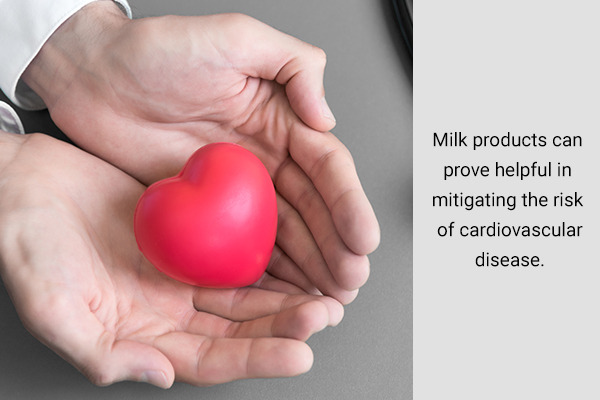
Regardless of the fact that dairy products have a considerable fat content, their consumption is unlikely to raise your odds of developing cardiovascular ailments.
In fact, an ever-expanding body of scientific evidence points much to the contrary and suggests that milk products can prove helpful in mitigating the risk of cardiovascular disease. (10)
This is corroborated by a study which suggests that milk has a neutral effect on cardiovascular outcomes, but fermented dairy products, such as yogurt, kefir, and cheese can engender a positive as well as a neutral effect.
Moreover, if nothing else, the intake of full-fat dairy products can help significantly supply you with essential nutrients, in particular, vitamin D and vitamin K. (11)
To sum up, the inherent nutrient composition of milk which includes vitamin D, calcium, potassium, magnesium, phosphorus, protein, and bioactive peptides, as well as dairy fatty acids is essentially heart-healthy as it proactively helps prevent and manage several cardiovascular risk factors.
9. Ensures vibrant skin

Milk is considered to be one of the best skin care ingredients that exist. In fact, milk has been used as a beauty aid for centuries. There is evidence that Cleopatra, the queen of ancient Egypt, used to take milk baths, which was the secret behind her smooth and flawless skin.
The effectiveness of milk in protecting the skin from sun damage and keeping it moisturized can be attributed to the amino acids present in it. Furthermore, the vitamin A content of milk has an antioxidizing effect and works as a free radical scavenger that helps prevent premature skin aging due to oxidative stress.
Plus, the lactic acid in milk acts as a natural exfoliating agent, helping remove dead skin cells and other residues that contribute to dull-looking skin and problems like acne. (12)
- For vibrant-looking skin, wash your face with warm water and then apply some whole milk using a cotton ball.
- Allow it to dry on its own and then rinse it off with warm water.
- You can use this cleansing and moisturizing treatment daily to maintain soft, clean, and supple skin as well as reduce fine lines and wrinkles.
Note: Avoid using whole milk if you have acne-prone skin.
10. Reduces cancer risk
Several studies reveal that milk may also reduce the risk of cancer in both men and women. The high amount of calcium, vitamin D, and conjugated linoleic acid (CLA) in milk is known to have anticancer benefits. (13)
A study conducted by scientists at The University of Otago found that regular consumption of milk reduced the risk of bowel cancer by 30% among people who drank it daily while at school. (14)
Milk also reduces the risk of colorectal, breast, and colon cancers. Some studies have suggested that low-fat milk may reduce the risk of ovarian cancer, but this risk reduction has not been universally corroborated by all related studies.
To enjoy the various health benefits of milk, you can drink milk as well as include dairy products like cheese, yogurt, butter, cottage cheese, and flavored milk in your diet. If you are lactose intolerant though, you can try lactose supplements to reap milk’s benefits.
Nutritional Value of Milk
Milk ranks high among the world’s most potent wholesome foods, to the extent that it is often touted as “nature’s wellness drink.” Milk is one of the food items that provide a unique balance of nutrients, all of which are fundamental building blocks for the growth and development of our bodies.
According to the National Dairy Council, milk also contains nine essential nutrients: calcium, protein, potassium, phosphorus, riboflavin, niacin, and vitamins A, D, and B12. (15)
Nutritional value of 1 cup of whole milk:
- Water – 215.04 g
- Energy – 149 kcal
- Protein – 7.69 g
- Total lipid – 7.93 g
- Carbohydrate – 11.71 g
- Sugars, total – 12.32 g
- Calcium, Ca – 276 mg
- Iron, Fe – 0.07 mg
- Magnesium, Mg – 24 mg
- Phosphorus, P – 205 mg
- Potassium, K – 322 mg
- Sodium, Na – 105 mg
- Zinc, Zn – 0.90 mg
- Riboflavin – 0.412 mg
- Niacin – 0.217 mg
- Folate – 12 mcg
- Vitamin B-12 – 1.10 mcg
- Vitamin A – 112 mcg
- Vitamin D – 3.2 mcg
It is this rich and diverse nutritional composition that makes milk a great value addition to your diet. In fact, it would suffice to say that a wholesome and well-balanced diet is incomplete without a generous supply of dairy goodness.
Precautions and Risk Factors
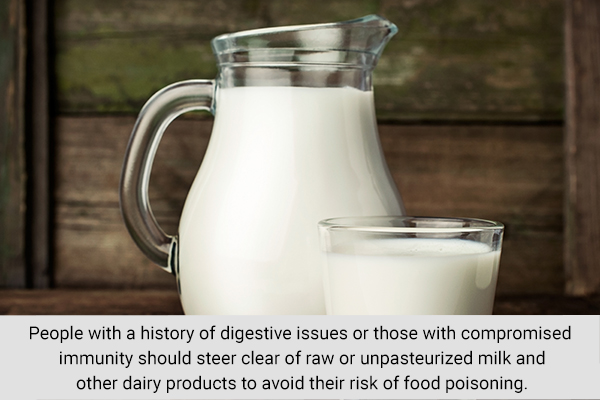
- Unfortunately for some, digesting the natural sugar or lactose present in milk is a huge ordeal and can lead to a number of digestive discomforts, such as bloating, stomach pain, flatulence, and diarrhea. The condition is called lactose intolerance.
- People who are allergic to milk protein or sensitive to cow milk, as well as those on a vegan diet, can and should avail the below-mentioned substitutes without any cause of concern.
- It’s ideal to store pasteurized bottled milk in the refrigerator to prevent it from going bad, and to consume it before the expiry date mentioned on the packaging.
- People with a history of digestive issues or those with compromised immunity should steer clear of raw or unpasteurized milk and other dairy products to mitigate their risk of food poisoning.
However, with the widespread prevalence of this condition (lactose intolerance), there are several non-dairy alternatives available, such as:
- Almond milk
- Soy milk
- Coconut milk
- Rice milk
- Hemp milk
- Cashew milk
When availing such substitutes, one should bear in mind that they often come with added sweeteners, preservatives, or artificial flavors that take away the nutritional value of the product. Try to incorporate only those varieties of milk that are devoid of such ingredients, organic, and GMO-free as well.
Expert Answers (Q&A)
Answered by Ms. Anne Van Meerbeke (RDN)

Adults need approximately 400–1000 IU vitamin D and 1000–1200 calcium/day. Milk provides 25–30% of calcium and 12–25% vitamin D per glass. Additionally, milk provides 7 other nutrients including protein which contributes to bone health.
Literature suggests that adults should consume 3 servings of dairy per day. However, as little as 1–8 oz glass of milk in addition to other dairy products can contribute to your nutritional health by providing an easily absorbable form of fat-soluble vitamins and minerals.
Adding milk to your diet can contribute to weight loss in the presence of controlled calorie intake. Skim, low fat, chocolate, and whole milk contains whey protein which has been shown to decrease adiposity by breaking down fat more efficiently.
The whole milk version may provide more satiety and the lower fat versions contain fewer calories and fat while providing the same nutrients. The whey protein may also contribute to maintenance of lean muscle mass. However, the addition of milk alone does not foster weight loss.
Moderation is always paramount when it comes to nutrition. There is usually no toxicity to drinking excess milk unless you have a medical condition that warrants protein or mineral limitations. That being said, toxicity can arise when the cow ingests toxic substances in the feed.
The best substitute for lactose intolerant individuals is lactose-free milk which contains the same nutritional value as of whole lower-fat versions without the lactose.
For those individuals who prefer to avoid cow’s milk, there are many substitutes including almond, soy, rice, coconut, etc. Consumers should be aware that the nutritional content varies and many are not fortified with vitamin D and have less available protein. Additionally, additives may be added during processing.
I would have to say that soy milk is the best alternative to cow’s milk since it is equivalent in protein and fat. Additionally, it is available in different varieties.
Anytime is a good time to drink milk. To get the best nutritional push avoid drinking with an iron rich meal since it binds with that mineral.
Final Word
Vitamin D is an important fat soluble vitamin needed for many body functions. Milk is an excellent source of vitamin D and calcium which support bone health.
The type of milk you consume should always be tailored to your taste and affordability. Be an educated consumer by reading labels and ingredients to find the milk that’s right for your needs!
- Was this article helpful?
- YES, THANKS!NOT REALLY


